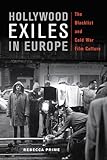Hollywood Exiles in Europe : The Blacklist and Cold War Film Culture / Rebecca Prime.
Material type: TextSeries: New Directions in International StudiesPublisher: New Brunswick, NJ : Rutgers University Press, [2014]Copyright date: ©2014Description: 1 online resource (264 p.) : 23 photosContent type:
TextSeries: New Directions in International StudiesPublisher: New Brunswick, NJ : Rutgers University Press, [2014]Copyright date: ©2014Description: 1 online resource (264 p.) : 23 photosContent type: - 9780813562629
- 9780813562636
- Blacklisting of authors -- United States -- History -- 20th century
- Blacklisting of entertainers -- United States -- History -- 20th century
- Cold War -- Influence
- Expatriate motion picture producers and directors -- Europe -- History -- 20th century
- Motion picture actors and actresses -- United States -- History -- 20th century
- Motion picture industry -- Political aspects -- California -- Los Angeles -- History -- 20th century
- Motion picture industry -- Political aspects -- Europe -- History -- 20th century
- PERFORMING ARTS / General
- 302.2 302.234309409045
- PN1993.5.E8 P65 2014
- PN1993.5.E8 P65 2014
- online - DeGruyter
- Issued also in print.
| Item type | Current library | Call number | URL | Status | Notes | Barcode | |
|---|---|---|---|---|---|---|---|
 eBook
eBook
|
Biblioteca "Angelicum" Pont. Univ. S.Tommaso d'Aquino Nuvola online | online - DeGruyter (Browse shelf(Opens below)) | Online access | Not for loan (Accesso limitato) | Accesso per gli utenti autorizzati / Access for authorized users | (dgr)9780813562636 |
Frontmatter -- CONTENTS -- Acknowledgments -- Introduction -- 1. The Radical Community in Hollywood -- 2. Life on the Blacklist: Production and Politics in Postwar Europe -- 3. The Blacklist and "Runaway" Production -- 4. The Blacklist, Exile, and the Transatlantic Noir -- 5. Cosmopolitan Visions, Cold War Fears -- 6. Blacklisted Directors, Art Cinema, and the Caprices of Film Criticism -- 7. The Legacy of the Blacklist -- Conclusion -- Notes -- Selected Bibliography -- Index -- ABOUT THE AUTHOR
restricted access online access with authorization star
http://purl.org/coar/access_right/c_16ec
Rebecca Prime documents the untold story of the American directors, screenwriters, and actors who exiled themselves to Europe as a result of the Hollywood blacklist. During the 1950s and 1960s, these Hollywood émigrés directed, wrote, or starred in almost one hundred European productions, their contributions ranging from crime film masterpieces like Du rififi chez les hommes (1955, Jules Dassin, director) to international blockbusters like The Bridge on the RiverKwai (1957, Carl Foreman and Michael Wilson, screenwriters) and acclaimed art films like The Servant (1963, Joseph Losey, director). At once a lively portrait of a lesser-known American "lost generation" and an examination of an important transitional moment in European cinema, the book offers a compelling argument for the significance of the blacklisted émigrés to our understanding of postwar American and European cinema and Cold War relations. Prime provides detailed accounts of the production and reception of their European films that clarify the ambivalence with which Hollywood was regarded within postwar European culture. Drawing upon extensive archival research, including previously classified material, Hollywood Exiles in Europe suggests the need to rethink our understanding of the Hollywood blacklist as a purely domestic phenomenon. By shedding new light on European cinema's changing relationship with Hollywood, the book illuminates the postwar shift from national to transnational cinema.
Issued also in print.
Mode of access: Internet via World Wide Web.
In English.
Description based on online resource; title from PDF title page (publisher's Web site, viewed 30. Aug 2021)


